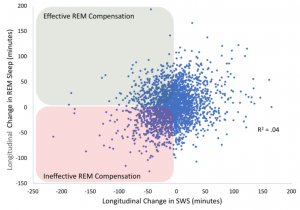What is the purpose of sleep? In Ancient Egypt and in Greek Mythology, sleep was considered to be akin to death, but science now tells us that sleep is a biological drive necessary for healthy life. Our laboratory is focused on understanding sleep’s role in healthy cognitive and neural functioning.  When we are not sleeping well, that affects the neural underpinnings of attention, stress control, and memory.
When we are not sleeping well, that affects the neural underpinnings of attention, stress control, and memory.
Early cognitive scientists believed that the memory benefits of sleep were a mistake (Ebbinghaus, 1885) or that sleep passively protected individuals’ memory from interference (Jenkins & Dallenbach, 1924). However, with the development of polysomnography and neuroimaging, sleep could no longer be viewed as a passive and invariant state. In the 1960-70s, Bruce Ekstrand and colleagues observed that different stages of sleep were associated with differential effects on memory. However, such findings were not fully appreciated until several decades later when researchers discovered that memories are “replayed” in the hippocampus during slow wave sleep and REM sleep. Our lab works to bridge the gap between these basic sciences findings and real-world outcomes for classroom learning and cognitive aging.
Implications for Aging and Alzheimer’s Disease
Most research on sleep and cognition focuses on college-aged adults, ignoring how consolidation may change with aging and disease. Separate research literatures have reported substantial age-related sleep disturbances and notable cognitive declines in older adults. These literatures converge on an intriguing question: Is there a cumulative impact of poor sleep on cognitive functioning across the lifespan? If so, then how do dynamic changes in SWS and REM sleep protect one against amyloid accumulation, cortical thinning, and other deleterious age-related effects on the brain?
Our research has found that older adults show reduced sleep-dependent memory benefits and that poor sleep in middle age can predict cognitive health in older age. This research has been covered by Fox News, Huffington Post, and others.
Improving Sleep Health:
Because sleep is important for many health outcomes, our laboratory actively works to develop, refine, and broadly implement interventions for improving sleep. We have incentivized students to sleep better by offering extra credit, we have investigated light and sleep hygiene interventions for dementia caregivers, and we have helped adults fall asleep faster by having them write their to-do lists before bedtime. This line of research has been covered by many media outlets, including Good Morning America.

Extra credit incentives motivate students to prioritize better sleep habits during final exams week, yielding positive outcomes for their test performance (Scullin, 2019; King & Scullin, 2019).
Our favorite non-pharmacological tips for improving sleep are listed here and below:
